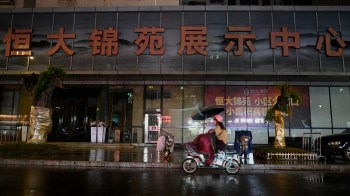How capital controls work and sometimes don’t
Last year money ran screaming from emerging markets — to the tune of $735 billion in net outflows, according to Institute for International Finance.
“This is really an amazing amount and comes after fairly steady inflows for many, many years,” said Charles Collyns, the chief economist at the IIF. “This is the first time we’ve seen capital outflows since the late 1980s and the amount is really mind boggling,”
The vast majority of that money poured out of China, which has long used various capital controls to try to keep too much money from leaving the country. Other countries, including Azerbaijan, Saudi Arabia, and Nigeria have recently put in place new rules and regulations also designed to keep money in.
Much like when officials at a failing financial institution fear a run on the bank and try to limit withdrawals from depositors, governments may use capital controls to try to stem outflows. Other countries might use measures, such as taxes on investments, to limit the flow of funds into a country.
“Most people believe, myself included, that you really only want to put controls on capital outflows in … very extreme crisis situations,” said Jonathan Ostry, deputy director of research at the International Monetary Fund. “The best way to protect yourself from experiencing a sudden stop in inflows is really to work when times are good, to try to moderate the boom so that you have a lesser tendency for a bust.”
Still, it’s difficult to say how effective capital controls are, often because it’s hard to separate the impact of the controls from the circumstance that precipitated them, said Michael Klein, a professor at the Fletcher School at Tufts University.
In general, Klein said, long-term controls tend to work better than short-term, reactionary ones, which people often find ways to get around.
A notable exception might be restrictions Iceland put in place in 2008 after its banking system collapsed.
“What the country did was put in very wide ranges of controls over virtually all assets,” said Klein. “Iceland was able to recover more quickly, I think, than it would have, had the money actually left the country.”
However, capital controls can rattle investors, said Anusha Chari, an economics professor at the University of North Carolina at Chapel Hill.
“It does have the unintended consequence of making foreign investors less likely to invest in your country in the future,” she said. “And as far as your domestic citizens are concerned, if that restriction is lifted at some point, there’s going to be the temptation to get the money out when you can.”
There’s a lot happening in the world. Through it all, Marketplace is here for you.
You rely on Marketplace to break down the world’s events and tell you how it affects you in a fact-based, approachable way. We rely on your financial support to keep making that possible.
Your donation today powers the independent journalism that you rely on. For just $5/month, you can help sustain Marketplace so we can keep reporting on the things that matter to you.


















